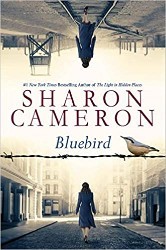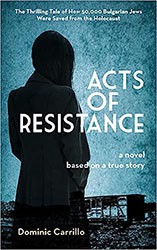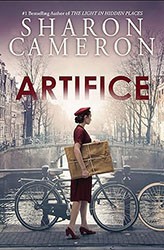In 1939, life in the Ukraine feels uncertain for fourteen-year-old Hanna Slivka and her family. Jews aren’t quite accepted in their small shtetl, and there’s anti-Semitism all around, in the form of taunting, name-calling, and stone-throwing. Much of Hanna’s childhood is spent outdoors preparing for Jewish holidays with her family, and decorating traditional Ukrainian Easter eggs with her friendly Christian neighbor. Still, Hitler’s army is on its way. Hanna’s family and the other Jews of the shtetl hear they will be deported or simply rounded up and shot. Hanna’s family decides to hide in a remote cabin deep in the forest. It is not easy for a family with young children to make life work in this new situation, but Hanna focuses on the beauty of nature and on helping her family survive. She learns to use the calls of forest animals as alarms or camouflage in times of danger. She finds unexpected courage in the bravery of her father and uncle, who risk their lives to provide for the family. Still, she remains a teenaged girl. She thinks often of Leon, a special friend close to her age who is also in hiding with his family, and hopes he is safe. Eventually the two families reunite and hide together.
As time passes, the forest cabins are deemed unsafe and the families move into a cave even deeper in the forest. The underground cave is a frightening place to hide. It is dark, far from fresh air, and reminiscent of a burial place. Through times of danger, hunger, and uncertainty, Hanna and her family persevere. At the end of the war, they return to their homes and find they are welcomed by very few of their former neighbors. Most Jews have not survived; many non-Jews are threatened by their return and act violently towards them. They know they can never make a new life in their former home, so Hanna and her family change their names and plan to leave for the United States. Leon’s family change their names as well, and move to another location in the Ukraine. The one loyal Christian friend who aided them throughout is remembered with gratitude and love. But Hanna carries the legacy of fear and terror with her across the ocean, and it takes her years to tell her daughter the story of her former life and true identity.
The story is based on the true experiences of people like Hanna and her family, and is told effectively and movingly. Hanna is an admirable role model for young readers. The period depicting life in the underground cave is described in particularly powerful prose. An author’s note at the end gives historical background and helps separate fiction from fact. This is a well written and highly recommended selection for ages 12 and up.
Michal Hoschander Malen is the editor of Jewish Book Council’s young adult and children’s book reviews. A former librarian, she has lectured on topics relating to literacy, run book clubs, and loves to read aloud to her grandchildren.




